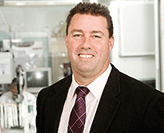Cancer therapy secures $27.1m funding
Viralytics Limited, a biotech company founded by University of Newcastle and Hunter Medical Research Institute (HMRI) researcher Darren Shafren, has announced a capital raising venture of $27.1 million to complete international trials of anti-cancer therapy known as CAVATAKTM.

Fifteen years in the making, CAVATAKTM is potentially among the most significant immunotherapy drugs developed for the treatment of melanoma over the past decade.
A Phase 2 trial is currently underway in the US with late-stage melanoma patients while a separate trial is assessing the multiple intravenous dosing of CAVATAKTM in patients with tumours including prostate, lung or metastatic bladder cancers.
Viralytics announced it has binding commitments to raise $23 million through leading US- and UK-based specialist healthcare institutional investors and will also raise up to $4.1 million through a special share offer.
Seed funding for the project was provided by the Greater Building Society in 1998 after Associate Professor Darren Shafren, from the University of Newcastle, was named the inaugural recipient of the HMRI Award for Early Career Research.
Associate Professor Shafren and his team have since demonstrated the effectiveness of a common cold virus (Coxsackievirus A21) as a potential treatment to kill cancer cells. Viralytics was later formed to commercialise the development of CAVATAKTM.
HMRI Director Professor Michael Nilsson described the announcement as a wonderful example of how seed funding for a promising idea could develop into something of this magnitude.
"It's an original idea, conceived in the Hunter, which operates on a new treatment principle," Professor Nilsson said. "Darren and his team have been remarkably astute from both a scientific and commercial perspective in progressing the therapy along the translational pathway.
"Projects of this kind are what the Hunter has the potential to deliver and the perfect outcome of our mission around translational medicine."
Professor Nick Talley, the University of Newcastle Acting Deputy Vice-Chancellor (Research), echoed Professor Nilsson's thoughts: "This novel approach to funding will ensure we continue to develop world class health research in the Hunter, for the benefit of the local community and beyond," he said.
Viralytics CEO Dr Malcolm McColl said the company had achieved major advances with the virotherapy in 2013, giving excellent momentum entering 2014.
"We can now more rapidly advance the program and will be in a strong financial position to negotiate with pharmaceutical partners and optimise commercial outcomes," he said.
"Support from leading specialist healthcare funds in the US and UK and small cap investors in Australia recognises the increasingly promising clinical trial outcomes achieved by the company in 2013 and validates the outstanding commercial potential of CAVATAKTM."
Mr Don Magin, chief executive of the Greater Building Society, said that hearing about the ground-breaking research being done by Associate Professor Shafren had inspired the Greater Building Society to become a founding supporter of HMRI.
"It is very rewarding to see home-grown research that the Greater Building Society helped to kick-start be taken to the next level of clinical trials and closer to commercialisation," Mr Magin said.
"More importantly it is exciting that this Hunter idea has the potential to help many people locally and world-wide," he added.
"This story shows why Hunter businesses must get behind our local medical research institute and its very talented researchers."
Contact
- Sheena Martin
- Phone: +61 2 4921 8714
Related news
- Former Australian Prime Minister honoured at University of Newcastle graduations
- Breaking barriers: First doctors graduate from equity pathway
- Advancing Human-Agent Collaboration Through Agentic AI
- Translating compassion: a linguist's commitment to social inclusion
- From Research to Reality: New Algorithms Revolutionise Geotechnical Design
The University of Newcastle acknowledges the traditional custodians of the lands within our footprint areas: Awabakal, Darkinjung, Biripai, Worimi, Wonnarua, and Eora Nations. We also pay respect to the wisdom of our Elders past and present.